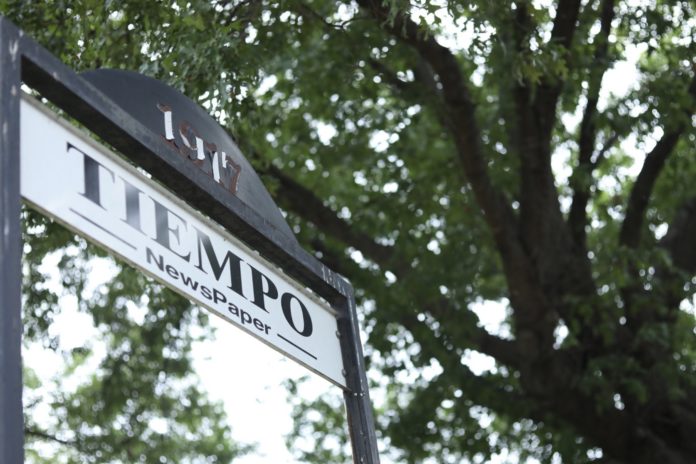
By Rewon Shimray | Staff Writer
The Baylor and Waco community felt the loss of Waco’s Chicano community newspaper Tiempo, which stopped publication this summer.
Publisher Ernesto Fraga had a heart attack followed by several strokes, “leaving him unable to continue publication,” according to the Tiempo Newspaper Facebook page.
Both Tiempo and Ernesto Fraga gave voice to the local Hispanic community that Wacoans are now having to do without.
Robert Aguilar, a community activist and decades-long friend of Fraga, said Fraga and his wife, Linda Fraga, walk three times a week at Richland Mall to aid his recovery.
“I don’t think Ernesto is finished,” Aguilar said. “Physically he is well; his body is well. His only problem is his speech, but in a year’s time, that will be corrected and I think it will come back. It may not come back as a weekly anymore, but it will come back as a paper.”
Tiempo was a weekly publication with 10,000 copies distributed throughout McLennan County and areas in Temple free of charge, the Waco Tribune reported. The paper released its last issue on July 25.
Tiempo began publication in 1977 with original owner and publisher Manuel Sustaita, and Fraga acting as the editor. Fraga took over the publication in 1987.
Tiempo was created at “a time of necessity,” because local newspapers were not paying attention to nor writing about immigrants, Macarena Hernández, professor of journalism, said. Tiempo was the only newspaper in Spanish at the time. Hernández said newspapers did not view minorities as subscribers in the ’70s and ’80s, so Tiempo became “the official historian of Latino challenges and obstacles and stories.”
The paper covered local family-oriented stories (such as quinceanera coverage) and helped bridge the gap between Baylor and Waco as well as Mexican-Americans and immigrants, according to Hernández.
Fraga offered to run an ad for Festival Latino, a three-day, cultural event hosted by the Hispanic Student Association as well as other Hispanic student organizations in Spring 2017.
Houston junior Gabriela Fierro, Hispanic Student Association (HSA) president, said it was the largest cultural Latino event the group has ever had with over, 1,000 in attendance.
“We had never had so many people from the Waco community come to one of our events, which is something that we had struggled with, so I feel like [Tiempo] did a really good job bridging that gap that needed to be bridged,” Fierro said.
Fierro said HSA has been able to continue a relationship with the Waco community after the event.
Tiempo also published articles critical of commissioners of city council, school board, highway department and businesses with discriminatory practices, according to Aguilar.
“He started it as a voice for equality, as a voice against discrimination in employment, against police brutality, against abuse by politicians and contracts, all that he exposed,” Aguilar said. “As time went on, things mellowed out. I think one of the reasons things changed in Waco was because Tiempo would expose what they did. And I think that scared the system.”
Before working at Tiempo, Fraga was a two-time Texas State president of Jr. League of United Latin American Citizens (LULAC), an employee at the Community Action Agency and an organizer of a chapter of the Brown Berets in the South Texas Valley. Aguilar, who encouraged Fraga to join Jr. LULAC when he was in high school, said Fraga was a “natural born leader.”
Aguilar said Fraga used his skills of community organizing and social justice advocacy that he gained from his former involvements in Tiempo.
“I look at the Chicano movement, which El Tiempo is a part of. It is everything that we’re trying to accomplish in America for the benefit of the Hispanic community,” Aguilar said. “Right now we need more organizations like El Tiempo to expose many things that other media doesn’t want to do. That’s why community papers are so important. We need to revive that paper.”
Hernández said Fraga leaves a “huge void,” but she hopes his work will live on through the people he has mentored. Aguilar said he envisions Baylor journalists keeping a written publication of the Chicano movement going.
“A lot of the aspirations that the members of HSA have are really fueled and motivated by those who are role models,” Fierro said. “Ernesto Fraga is one of those role models in the Latino community.”
Fierro said Fraga’s story showed her the need for initiative and action. She said it always stuck with her that Fraga and his wife distributed the paper themselves when Tiempo first started publication.
“We have to go out into the community. If we want people to come, we have to go out there and bridge that gap ourselves,” Fierro said. “The newspaper and Ernesto left that example that you can’t just want something — like, I wish the Waco community was coming to our events or I wish there was more unity —you have to go out and do it.”





